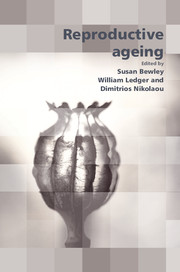Book contents
- Frontmatter
- Contents
- Participants
- Declarations of personal interest
- Preface
- SECTION 1 BACKGROUND TO AGEING AND DEMOGRAPHICS
- SECTION 2 BASIC SCIENCE OF REPRODUCTIVE AGEING
- SECTION 3 PREGNANCY: THE AGEING MOTHER AND MEDICAL NEEDS
- SECTION 4 THE OUTCOMES: CHILDREN AND MOTHERS
- SECTION 5 FUTURE FERTILITY INSURANCE: SCREENING, CRYOPRESERVATION OR EGG DONORS?
- SECTION 6 SEX BEYOND AND AFTER FERTILITY
- SECTION 7 REPRODUCTIVE AGEING AND THE RCOG: AN INTERNATIONAL COLLEGE
- SECTION 8 FERTILITY TREATMENT: SCIENCE AND REALITY – THE NHS AND THE MARKET
- SECTION 9 THE FUTURE: DREAMS AND WAKING UP
- SECTION 10 CONSENSUS VIEWS
- Index
Preface
Published online by Cambridge University Press: 05 February 2014
- Frontmatter
- Contents
- Participants
- Declarations of personal interest
- Preface
- SECTION 1 BACKGROUND TO AGEING AND DEMOGRAPHICS
- SECTION 2 BASIC SCIENCE OF REPRODUCTIVE AGEING
- SECTION 3 PREGNANCY: THE AGEING MOTHER AND MEDICAL NEEDS
- SECTION 4 THE OUTCOMES: CHILDREN AND MOTHERS
- SECTION 5 FUTURE FERTILITY INSURANCE: SCREENING, CRYOPRESERVATION OR EGG DONORS?
- SECTION 6 SEX BEYOND AND AFTER FERTILITY
- SECTION 7 REPRODUCTIVE AGEING AND THE RCOG: AN INTERNATIONAL COLLEGE
- SECTION 8 FERTILITY TREATMENT: SCIENCE AND REALITY – THE NHS AND THE MARKET
- SECTION 9 THE FUTURE: DREAMS AND WAKING UP
- SECTION 10 CONSENSUS VIEWS
- Index
Summary
Ageing can be welcomed, endured or feared but it remains inevitable. Obstetricians and gynaecologists are uniquely placed to see and to alleviate the complications of diseases of pregnancy and the reproductive organs. They have to be knowlegeable and skilled in their broad or subspecialist expert areas in order to provide high-quality medical services to women. They have an understanding of how age affects biology and disease, particularly when the population is ageing and in an era of deferred childbearing. They also have to respect and understand the complex lives that women lead and the diverse families and communities they come from, and be sensitive to the impact that obstetric and gynaecological problems may have. Our histories, examinations, tests, diagnoses and prognoses can threaten the core of a woman's identity and her fertility, sexuality, family and life experiences. Doctors have to avoid stereotypes and empathise with and listen to their patients but cannot always ‘walk in another's shoes’. The poems opposite distil some of the private pain and public pleas of women experiencing the adverse effects of reproductive ageing.
Since 1973, the RCOG has regularly convened Study Groups to address important topics in our specialty. Ageing and reproductive ageing affect us all as individuals and as society. Obstetricians and gynaecologists are witnesses to the impact of reproductive ageing and to some of the fears, misinformation and misapprehensions that the general public have. One purpose of the Study Group was to raise awareness of the societal trends and implications.
- Type
- Chapter
- Information
- Reproductive Ageing , pp. xiii - xivPublisher: Cambridge University PressPrint publication year: 2009



